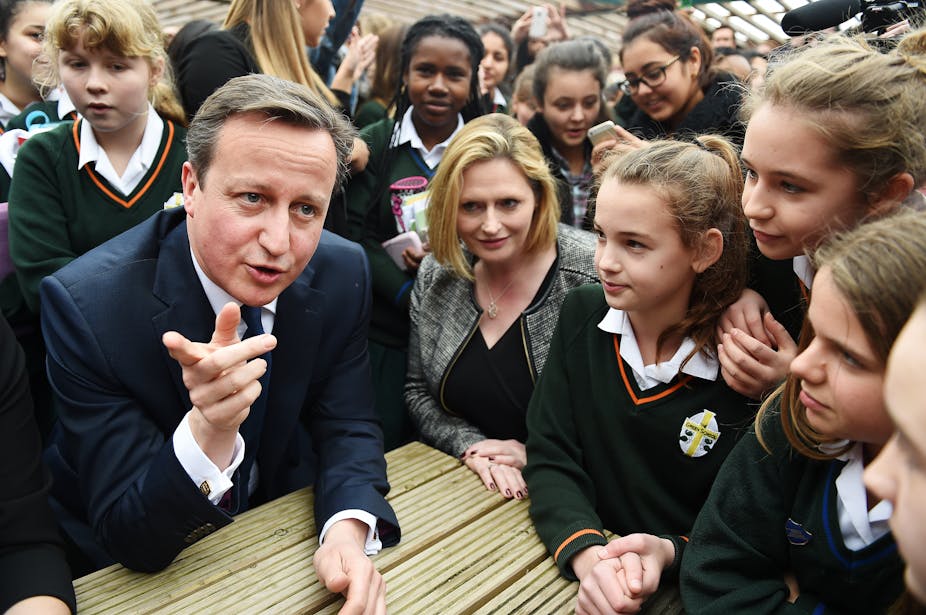The Conservative Party manifesto makes the following commitments in the area of school-age education:
A good primary school place for your child with zero tolerance for failure.
Turn every failing and coasting secondary school into an academy and deliver free schools for parents and communities that want them.
Help teachers to make Britain the best country in the world for developing maths, engineering, science and computing skills.
The party’s “plan of action” revolves around the curriculum, school structures (academies and free schools), funding and teachers.
Tough new standards?
On the curriculum, the Conservatives emphasise learning of the basic skills of literacy and numeracy in primary schools, and in secondary schools (where this fails). They are right to prioritise these areas. Inadequate literacy and numeracy is a problem for about a fifth of the adult population, and those aged 16-24 perform worse than those aged 55-65 (unlike in most other countries). Partly as a result, establishing basic literacy and numeracy leads to a high earnings return in later life.
Whether or not changing the curriculum will actually improve in these basic skills is another matter.
By “tough new standards”, the Conservatives mean learning times tables, complex multiplication and division, reading a book and writing “a short story with accurate punctuation, spelling and grammar” by the age of 11. One wonders what children are being taught at the moment.
The serious question is whether politicians are really best placed to decide on exactly what should be taught and how it should be done – especially in view of the fact that teachers complain about constant change and upheaval. An alternative would be to enable independent expert bodies to review the curriculum every few years.
School structures
The Conservatives claim that turning schools into academies is improving education for children, but we do not know whether or not this is true. We only have evidence for the first 100 or so schools that became academies under the Labour government – and that evidence is shows that they were effective.
These schools date from an era when academy status was still used almost exclusively for low-performing schools in disadvantaged areas. Schools that converted post-2010, on the other hand, generally having more advantaged intakes and higher performance before converting.
So although the programme was successful for them, it makes no sense to extrapolate the same success to the 4,000-plus schools of varying standards that have become academies since 2010. Any claim that continued rollout of the academies programme is or is not in the national interest is simply not based on evidence.
Free schools
The Conservatives also promise to open at least 500 new free schools. The demographic pressures are such that new schools are genuinely needed in many areas of the country (especially big cities). The important question is whether free schools are to be opened in areas with the greatest need for more places, or whether they will simply appear wherever local interest groups make the greatest fuss.
Since any post-May 7 government will need to keep a very tight lid on public expenditure, getting the greatest bang for their buck is all the more important. Making school places available is of prime importance, but having yet more choices available in areas with ample capacity won’t change much in terms of overall performance. It would also be very expensive.
Another question is what happens to areas that need additional places but do not receive good free school applications from would-be providers. It’s not clear from the manifesto whether local authorities would be allowed to step into the arena to set up new schools – and if not, why not.
School funding
The manifesto commitment around school funding is vague:
Under a future Conservative government, the amount of money following your child into school will be protected. As the number of pupils increases, so will the amount of money in our schools. On current pupil number forecasts, there will be a real-terms increase in the schools budget in the next Parliament.
It’s good to see a commitment to protect school expenditure, but this statement still falls a long way short. There is no commitment to protect per pupil expenditure in real terms. Also, no detail is given on what age range applies. Previous statements by the Conservatives have been widely interpreted as saying that post-16 expenditure will not be protected.
On a positive note, there is a commitment to provide the pupil premium at current rates so that schools receive additional funding for those from the poorest backgrounds. Here, there is real evidence to imply this will have an impact, because school spending is demonstrably important for improving performance – especially for students from disadvantaged backgrounds.
Teachers
There is a strong tone of “motherhood and apple pie” in the Tories’ policy on teaching: improve the number of qualified teachers, enable them to spend less time on bureaucracy, pay good teachers more, reduce the burden of inspections, and so on.
But it’s not clear how loosening the burden of inspections and scrutiny can be achieved without diminishing accountability, especially when so many schools are largely autonomous and struggling both with financial pressures and ever-changing curricular demands.
Maths and science is singled out for special attention – and this is certainly borne out by studies showing the importance of STEM subjects for labour market performance and the oft-heard industry claims of shortages in these areas.
Overall, there are some useful commitments in the manifesto – some protection of spending, targeting disadvantaged students, emphasis on basic skills – but the document fails to give any reasons for why we should believe that changing school structures will make a difference to overall performance.
The Conversation’s Manifesto Check deploys academic expertise to scrutinise the parties’ plans.

